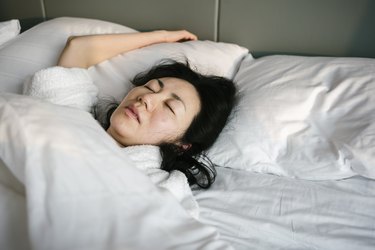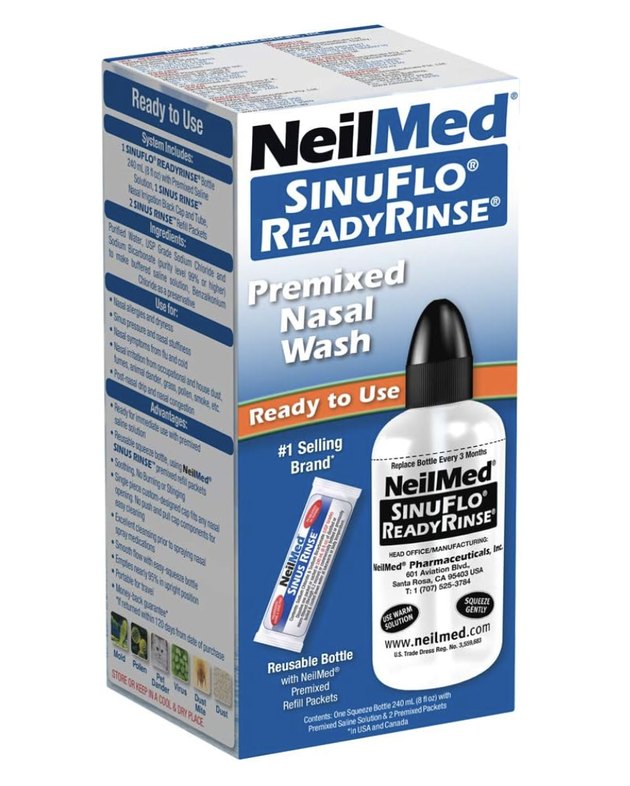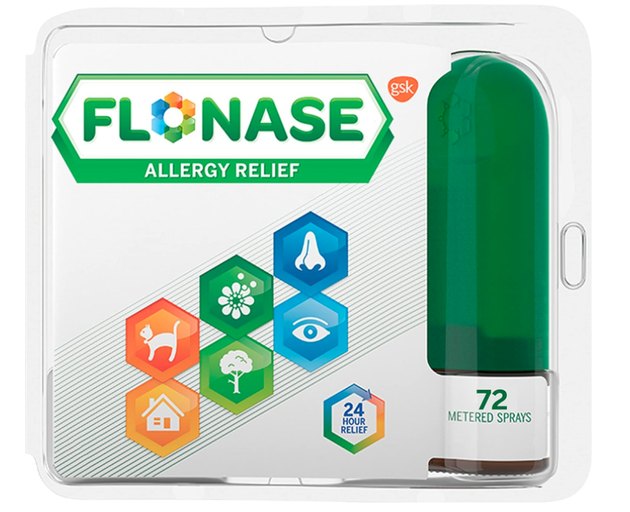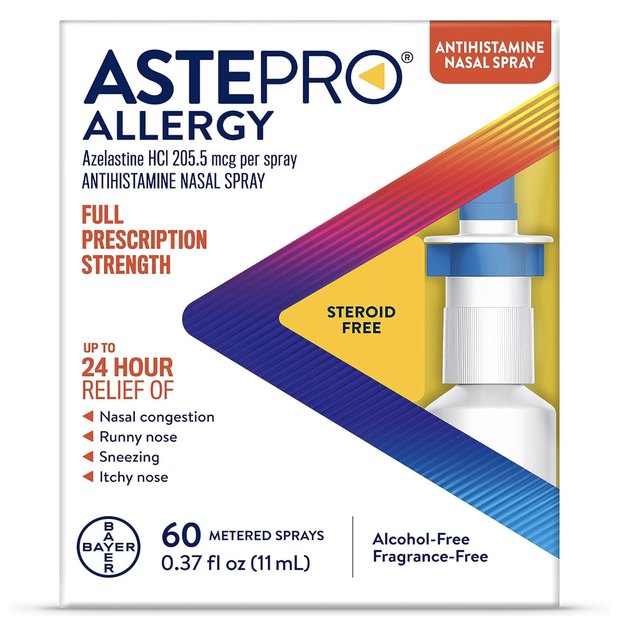
If you get the occasional congestion and stuffy nose at night (say, from a cold or allergies) nasal strips are a solution made to help you breathe easier.
The most popular brand of over-the-counter nasal strips is BreatheRight — adhesive strips designed to be placed on the bridge of your nose. They work by "pulling your skin and part of your nasal cartilage open — where air initially goes in — to open your internal nasal valve,"says Michael Yong, MD, a board-certified otolaryngologist (ENT) and fellowship-trained neurorhinologist at Pacific Neuroscience Institute in Santa Monica, CA.
Video of the Day
Video of the Day
While these strips can be helpful on the occasional night for some people, experts say they're not necessarily the best option for everyone — especially if you find yourself needing one every night.
Here, learn about nasal strip side effects and benefits, if it's OK to wear them every night and and alternatives based on your needs.
What Happens When You Use Nasal Strips?
1. They Can't 'Fix' Congestion
If your stuffiness is because of a cold, sinus infection or allergies, Dr. Yong doesn't typically recommend nasal strips as a treatment option. This is because your congestion is likely due to nasal passage inflammation (which a nasal strip won't heal).
But if you always have a hard time breathing through your nose (and congestion is not the culprit), it could be the shape of your nasal passages that's to blame. More on this below.
2. They Can Help You Breathe Better if You Have a Structural Issue
People who always have a hard time breathing through their nose might then become chronic mouth breathers, per Dr. Yong. "This often means they cannot breathe through their nose very well during the day, at night or during exercise," he adds.
This issue can be sign of a nasal valve collapse — a condition where the airways inside your nose become narrow, making it hard to breathe freely. Common causes of nasal valve collapse include the following, per the Cleveland Clinic:
- A deviated septum (i.e., the bones inside your nasal cavity are crooked or off-center)
- A recent nose job (or nose surgery recovery)
- A nose injury
- Genetics
A nasal valve collapse can make the stuffiness you get with a cold or allergies even worse, Dr. Yong says, which may also contribute to nighttime snoring.
In these cases, Dr. Yong recommends trying a nasal strip, because they can temporarily widen your nasal passages and make it easier to breathe.
If the strips work, you may be a candidate for surgery to fix this collapse, he says. Or if your collapse is mild, "you might use nasal strips when exercising, or at night when you have a cold, to get over that hump," he adds.
3. They Can Be a Temporary Fix While Waiting for Surgery
If you're waiting to get surgery for something like a deviated septum, wearing nasal strips every night to temporarily manage your symptoms could be helpful.
But "relying on nasal strips to breathe better every night is not a great long-term plan, because they're not a definitive fix," Dr. Yong says.
"If you're using them every day, it could mean you need a certain procedure," to more permanently treat nasal valve collapse or other structural issues, he adds.
4. They Can Cover Up a Sleep Disorder
If nasal strips are supposed to open your passageways immediately, what does it mean if you're not seeing an improvement after wearing them for a night or two?
"You could have a different condition that is affecting your breathing at night — like sleep apnea," Dr. Yong says.
Nasal strips could be hiding a much larger problem (like a sleep disorder) that may benefit from a more specific treatment.
5. They Can Irritate Your Skin
Another downside of nasal strips? The adhesive that keeps them on your nose may start to cause redness or irritation on your skin if you use them every day, he adds.
Sometimes, they stick to your skin so well that you have to use warm water and a cloth to help remove them.
Is It Bad to Use Nasal Strips Every Night?
Using nasal strips every night isn't dangerous. But if you need one regularly, there's a good chance you're missing an opportunity to get to the bottom of an underlying condition that requires a different treatment — like nasal valve collapse, a deviated septum or sleep apnea.
Plus, as we've learned, the adhesive might start to make the skin on your nose red or irritated within a few days of consistent use, according an August 2018 study in Allergy, Asthma, & Clinical Immunology.
The bottom line? It's OK to use a nasal strip if it helps you breathe easier. But you should let your doctor know if you need one frequently, so you can get to the root cause of your issue and treat it properly.
Alternatives to Using Nasal Strips Every Night
While nasal strips are not bad for you, they may not work that well, unless your nose has a structural abnormality (like a valve collapse).
While you can wear nasal strips at any point to see if they'll help you breathe easier, here are some alternatives in case it's congestion or something more you're dealing with:
- Nasal saline rinses: A saline rinse can help reduce inflammation of your soft nasal tissues. At the same time, it'll flush out allergens or irritants (like dust mites or pollen) that could be exacerbating the problem. Dr. Yong prefers rinsing with a nasal irrigation bottle (over rinsing with a neti pot), because it sends more saline through your nasal passages. Try NeilMed SinuFlo ReadyRinse.
- Nasal steroid sprays: When used regularly, over-the-counter options like fluticasone (Flonase) help reduce nasal swelling and inflammation to ease congestion. "They're safe to use on a regular basis and work best when used consistently over the course of a couple of months," Dr. Yong says. (Steer clear of nasal decongestant sprays like oxymetazoline (Afrin), which can actually make congestion worse when used for more than a couple of days at a time.)
- Antihistamine nasal spray: If you think allergies are making your nighttime stuffiness worse, an over-the-counter spray like azelastine (Astepro) can help reduce allergen-related inflammation in your nasal passages. "They have less side effects than oral antihistamines," Dr. Yong says.
- Snoring devices: If you're wearing nasal strips every night to relieve snoring, there are some other snoring remedies that can help. Your doctor may recommend a mouthpiece that keeps your jaw set in an optimal position, or a CPAP machine to help keep your airways open. These are also treatment options for obstructive sleep apnea, which can potentially cause snoring, per the Mayo Clinic.
- A sleep study: If you and your doctor have ruled out congestion and snoring, and the above remedies don't work for you, a sleep study may be a good next step. These detailed tests let doctors monitor things like your breathing, heart rate and movement over the course of one night, and they can help diagnose sleep disorders like sleep apnea or restless leg syndrome.
- Allergy, Asthma & Clinical Immunology: "Effects of nasal dilator strips on subjective measures of sleep in subjects with chronic nocturnal nasal congestion: a randomized, placebo-controlled trial"
- Cleveland Clinic: "Nasal Valve Collapse"
- Pacific Neuroscience Institute: "Michael Yong, MD"
- Mayo Clinic: "Obstructive Sleep Apnea"
Is this an emergency? If you are experiencing serious medical symptoms, please see the National Library of Medicine’s list of signs you need emergency medical attention or call 911.



